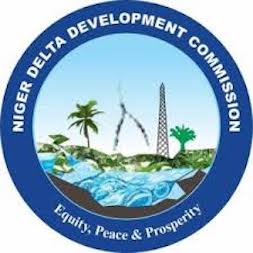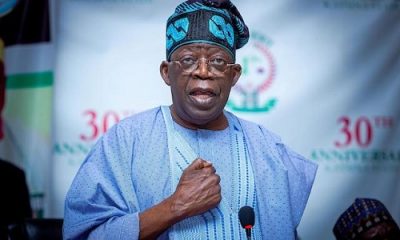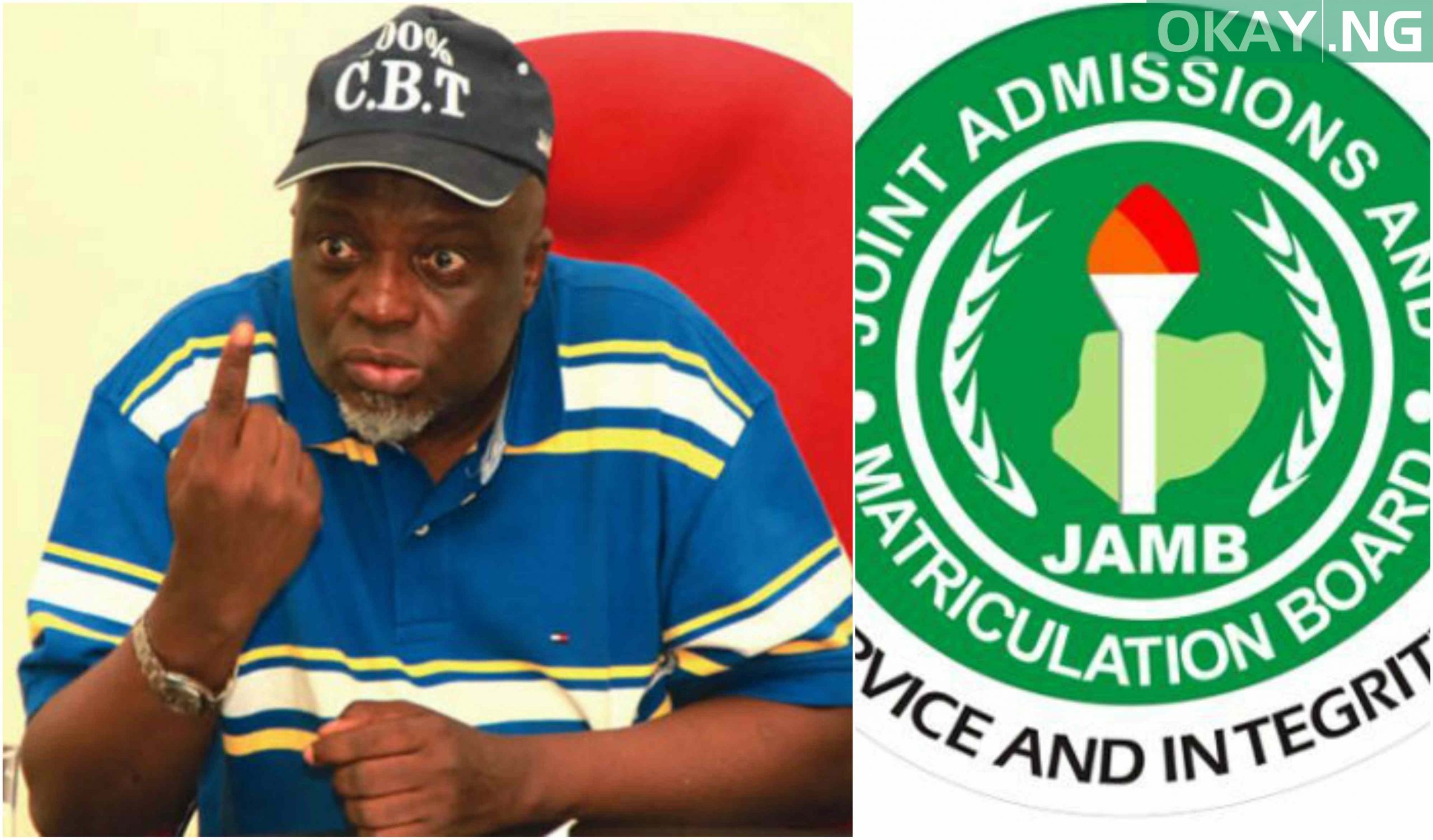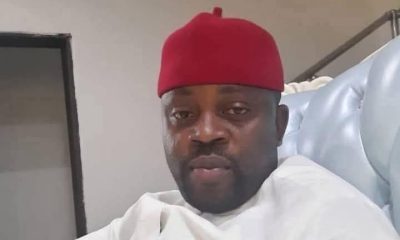OPINION
2023: The Familiar as Unknown

By Dakuku Peterside
You could call it premonitions, dreams, forecasts, or revelations. I have a clear guesstimate of possible scenarios that will shape our political future and help us better understand what will most likely happen before, during, and after the 2023 elections in Nigeria.
I have untangled the scenarios into four different periods or eras because the 2023 elections are more of a process than a panoply of events. The first era under review is the congresses and convention of the two major political parties that will lead to the emergence of the party executives that will midwife party convention that will produce presidential candidates. The second era is the party conventions/primaries where the candidates that will fly the flag of the different political parties are selected. The third era is the campaign period and the elections proper. The fourth era is post-election, with many dramas played by the gladiators that win or lose. The different period or era is viewed from an optimistic, pessimistic, or realistic prism.In the three-part article that will appear in this column within the next three weeks, I will share the different scenarios I saw in my “dreams” and the implications for the future of our country and its development trajectory. Each week’s article will develop each of the eras mentioned above and explore the possible scenarios given existing political actors, political environment, and political realities. Although we agree that the future is unknown and a day in politics is like a thousand days elsewhere, the pattern and critical trends emerging can help the politically discerning persons decipher and navigate the political future pre and post 2023 election.
I must point out ab initio that these are mere projections, albeit based on analysis of facts gleaned from current realistic political actors, processes, and environment. They do not represent the objective political realities of the future. There may be deviations and minor differences between these forecasts and actual events of the future, but I am bold to state that the differences may not be significant. History does not suggest anybody can predict future political events with precision as there are constantly intervening variables. These scenarios map the political scenes and help people make sense of the unfolding political permutations and intrigues that follow in the next few months.
The congresses and national convention of the parties in Nigeria to elect party officers, especially the two major political parties, are usually an intricate, tense, ding dong affair, full of intrigues, horse-trading, alliances, and betrayals. In recent years in Nigeria, the national convention of the major political parties is about power blocs and a dress rehearsal of the battle for the presidential ticket rather than individual delegates’ desires or ideological leaning.
The substantial nexus between democracy and party politics means that the congresses/convention set the tone for the future of a political party and invariably the country if elected to power. The degree of democratic process applied in electing party officials and party officials’ quality determine the party’s organisational capacity, resilience, inclusiveness, and commitment to democratic rules.
For the ruling All Progressives Congress (APC) and the opposition People’s Democratic Party (PDP), the congresses/national convention to elect party officers would likely indicate what lies ahead for democracy in the country and perhaps the sustainability of the entire Nigerian entity. Suppose the two parties continue with a lack of internal democracy, imposing party officials and allowing vested interests to exploit narrow ethnic, geo-regional, religious, or other primordial considerations of the representatives to gain ascendancy in the party. In that case, they may invariably be singing the Nunc dimittis for the party and, by extension, democracy in Nigeria.
The first step towards the congresses is usually selecting or electing delegates for the congresses/ national convention. Each of the political parties has carefully laid down procedures on how delegates are chosen or elected. But in most cases, influential party leaders who are connected, officeholders, the rich and powerful, manipulate this process to their advantage. We have seen instances where officeholders and governors literarily appoint all party delegates and officials instead of the party men and women electing officials. This anomaly gives enormous powers and undue advantage to officeholders, party leaders, especially the governors, and makes the congresses/ convention look more like a coronation than an election of party leaders.
In most cases, the party leaders elected or appointed are a pointer to which geopolitical zone and who would become the presidential candidate, senators, and members of the House of Representatives, at the federal level and governorship candidates and legislators at the state level. It means that having been elected, the party leaders make it a duty to ensure that their sponsors and preferred aspirants become the party candidates either by hook or by crook. This is often the root of the internal conflict in political parties.
For the two major political parties’ congresses/ national convention, I foresee internal implosion if they continue with the culture of imposition and lack of internal democracy in whatever guise. The two major political parties will be holding their national conventions to elect new party executives by the last quarter of 2021/the first quarter of 2022. Three possible scenarios will play out in the APC and PDP: The first scenario is that governors, due to their power of patronage, access to state purse and collegiate arrangement may hijack the process and put together executives that will serve their interest or aspiration to the exclusion of major political actors. There will be a high level of rumbling among the different power blocs and different potential aspirants of the party, most of whom will lose out.
The second scenario is that key leaders of the party, very often potential candidates and those with connection to major power brokers, due to their economic power or perceived influence, hijack the political process in the name of “consensus” or “preferred slate”, and some governors’ revolt. For instance, in the PDP, a rich south-south Governor may be leading one bloc, whilst a former presidential candidate may lead another bloc and some governors leading a third bloc. The APC may witness the emergence of three power blocs, one lead by politicians with a solid connection to the presidency; another by a rich, powerful former Governor of Lagos and the third being majority of governors elected on the platform of the party jostling for control of the party’s soul.
The third scenario is that the parties allow transparent popular internal elections, leading to the emergence of acceptable candidates who best represent the interest of the party’s grassroots and are in tune with the parties’ ideologies. This scenario is the most unlikely. Unfortunately, we do not have a culture of internal democracy which is the primary factor for persistent intra-party conflict, so I do not see the third scenario playing out.
Further analysis of the scenarios above indicates that the emergence of the first and second scenarios means a power bloc or two will lose out, and by extension, their chances of surviving as candidates in 2023 are almost nil. Any power bloc that loses may leave the party to look for other platforms to pursue their interest. The above may provide the basis for new internal party conflict and many court cases to address the perceived injustices arising from the non-conduct of proper congresses.
Meanwhile, the party officials that will emerge from the congresses/ convention will owe loyalty to a few persons in a clique and may not command the respect of majority party members. This anomaly will be the first sign of party implosion before the 2023 elections. Two pertinent rhetorical questions jump to mind: With no transparent internal democracy in the parties, what are the implications for democracy and party politics in Nigeria? What will be the implications of a sudden implosion of the parties on our political landscape?
One may postulate with a high degree of certainty the following circumstances surmise: first, the earlier the congresses and conventions occur, the more likely the major parties will splinter before the 2023 elections. Second, positioning the geopolitical zones that will produce the presidential candidates will be vital in deciding the area the national chairman of the respective parties will come from and even the parties’ future since there is an apparent North/South divide. Third, both parties may encounter one common problem: they pathologically have no respect for their own rules. Fourth, the parties do not have the institutional resilience to survive an upheaval among their key stakeholders as the parties are weaker than their principals. Fifth, crises will define the party congresses/ convention season while the judiciary will preside over the mayhem with potential risk to the judiciary’s reputation.
I advise that the parties’ leadership should do everything possible, as provided in their respective party constitutions and guidelines, to have a transparent congresses/ convention that substantially reflects popular sentiments. Doing this will strengthen the parties and, by extension, democracy.
Whichever scenario plays out, the emergent party leaders from the congresses/ convention, no matter the imperfections of the process that brought them, ensure that all uphold the rules and tenets of the party in all subsequent parties’ primaries and conventions. Their allegiance should be to the party and the country and not to any vested interest or whoever was instrumental in their emergence as party officials.
As the electoral umpire, the Independent National Electoral Commission (INEC), empowered by law to monitor the congresses, should be firm in enforcing the rules and more proactive in the performance of their duties. They should ensure that the congresses follow the guidelines enshrined in the constitutions and bylaws of the political parties. INEC should never be a tool used in manipulating the outcome of congresses, as may have been the case in the past.
The Nigerian judiciary has a role to play. In the book “How Democracies Die” by Steven Levitsky and Daniel Ziblatt, one of the conclusions is that bad politics and polarisation weakens the judiciary and media more than anyone can imagine. Post congress litigations in Nigeria have seen contradictory rulings and pronouncements by courts of coordinate jurisdiction. These poor judgements convolute the system and leave the reputation of the judiciary in tatters. The judges should rise above pettiness and brigandage. The National Judicial Council should ensure that no judge gets away with judicial rascality.
If we must get it right in 2023, if the parties will be vital to strengthen democracy and our democracy is to continue to thrive, the signpost would come from the conduct of the party congresses/ convention this year and early 2022. All the political actors must ensure that parties conduct their congresses with utmost transparency and integrity. For herein might lie the fate of our democracy and the republic.
Dakuku Peterside is a policy and leadership expert.
OPINION
This Trial of Oloyede
By Tunde Akanni
It’s been traumatic for my entire family since that video started making the rounds. I sneaked a slight view… It’s our trial. It’s my trial. Oloyede is genuine. He is most sincere. He is modestly so, as well. For us, however, Allah knows best.
I was with a trader in the afternoon of what I considered a dark Wednesday, the 14th of May. “Se bi won ni JAMB o get mo bayi…”. I had to cut in immediately. Which JAMB? “Madam, that’s one person I will vouch, and vouch for…zero tolerance for corruption. Absolutely responsible with a high level of consciousness for the good of others. If certain things went wrong at JAMB, I agree it’s his responsibility to carry all pleasant and other burdens but just know that the bad side of the operations may as well be sabotage. I have absolute trust in that man. Ask my own colleagues about me, but Oloyede is my own hero, somebody I have known for more than 40 years…”This is by no means a reductionist disposition to the tragedy induced by the so-called computer glitch. May the Almighty God in His infinite mercy console the parents of the candidate reported to have committed suicide. May God strengthen them to survive this gloomy phase of their lives and sustain them to reap bountiful compensation that will endure in their lives. It’s hard, so hard to pull tragedies of this magnitude. I personally feel for these parents.The said computer glitch, may we never fall victim to it. Those who work for big organisations requiring a large layout of ICT operations know what I’m talking about. Rather than being ‘solutional’, IT facilities can be unimaginably problematic sometimes, yet indispensable in this civilisational dispensation. This is not doubting deliberate sabotage, as may have happened in the case of JAMB. I’ve been part of Oloyede’s JAMB journey to attest to his commitment to offer his best for the otherwise sinking board.Far from being cosmetically exhibitionist, the Oloyede-led JAMB team, led by the Education minister, Tunji Alausa, went round the critical facilities of JAMB during the just concluded examination. Alausa saw, firsthand, like never before elsewhere in this country, how far JAMB had gone in its strive for transparency and the real-time monitoring of the conduct of examinations nationwide. Alausa, beyond being in awe, sought to make the JAMB effect spread immediately to other examination bodies.No be dem say, same day, the WAEC team came to JAMB and made it into the situation room, which was my own duty post. The NECO team followed suit afterwards, both duly led around by the sturdy lead IT consultant who’s been reliably there from Oloyede’s assumption of duty, Damilola Bamiro. Far richer, given that they charge more for their exams, the duo of WAEC and NECO were suddenly mandated to understudy the examination sector leader in Africa that JAMB has become over time.The staff of both WAEC and NECO suddenly had to undertake a professional excursion led through all the real time monitoring screens and other digital facilities. It was obvious they marvelled at what they saw, revealing a functional leader-subordinate synergy manifest with trendy output that the world can see and learn from.But that may even seem like the tip of the iceberg of the output of the hard work and commitment of the nation’s foremost icon of integrity in public service. A series of far more seemingly serious strides had been accomplished by Oloyede at JAMB. As a focused scholar, he keeps ensuring that every bit of the experience of the Board is treasured as worthy data to guide future actions and even subjects for further research.Not even the agencies dedicated to emergency matters in Nigeria could have been as prompt as the Oloyede management on this ugly glitch saga. Once the complainants began ventilating into the public space, JAMB rose to the challenge without any predictably traditional arrogant stance of government is always right. I was aware that a particularly strident public critic and a former students’ leader at Obafemi Awolowo University, Adeola Soetan commended the spokesperson for JAMB for the excellent handling of public complaints.Promptly, an independent team of investigators was set up to unravel the mystery leading to the rather depressing situation that now confronts us. The team, drawn from assorted but technically relevant constituencies, has found out that no fewer than 165 centres of over 800 examination centres nationwide were affected.Obviously well prepared for whatever the outcome may turn out to be, he braced up to the challenge to embrace the surrender value to tell it to the world as it is. This trial is for all of us who believe and trust Oloyede. I am in this group. So much so that his public cry infected me…It was a patriot’s cry for his beloved country. Like me, a former Law don at LASU, Dr Kilani wasn’t any less affected as demonstrated in a quick note to me: “I write to associate myself with the pain, sorrow and emotion of our own Professor Oloyede. I could not hold my tears seeing him cry. May Almighty Allah see him through. May we all not be put to shame…”But then came a soothing message from Gbade Osunsoko, my cousin: “…He will come out of this much stronger because Nigerians will trust him far better than a number of our leaders.. A man that makes mistakes happens under him and takes responsibility – it’s a big deal in Nigeria.”With Oloyede, young Nigerians with challenges regarding sight are no longer left to moan their fate endlessly, with adequate provision for their inclusion in the UTME. How many of our public facilities are this inclusion conscious as stipulated by SDGs? How come a legacy built through almost a decade at the very best cost ever possible will be made to crumble when the game changer leader remains ever modest? JAMB has steadily risen through thick and thin to accomplish its tasks to the admiration of stakeholders, nationally and internationally, under Oloyede. Both NNPC and the Nigeria Police, being beneficiaries, can attest to the current competence of JAMB. How many other numerous stakeholders nationwide never deemed to have any relevance to JAMB before Oloyede but have since become critical, if not indispensable players?But why does this sudden saddening encounter threaten our joy of service without blemish? Why this unforeseen truncation of a good story, so intentional, coming from Africa? Whodunnit? Surely the truth shall come out for the world to perceive and assess and get to appreciate the efforts and the quantum of commitment appropriated to the JAMB excellence project driven by Oloyede.One cannot but be deeply concerned. Before the very eyes of a few of us carefully selected to give support from our respective professional perspectives from the very beginning, Professor Oloyede’s concern for genuine growth and development was real. It is still real and increasingly so, as a matter of fact. Indeed, inimitable. It shall be well.Tunde Akanni is a professor of Journalism and Development Communications at the Lagos State University, LASU. Follow him on X:@AkintundeAkanniOPINION
Democracy, Institutions, and the Rule of Law

By Kator Ifyalem
Democracy, often hailed as the cornerstone of modern governance, is a system that empowers citizens to participate in the decision-making processes that shape their lives. However, the mere existence of elections is not enough to ensure a fair, just, and prosperous society.
Without robust institutions, the rule of law, and ingrained values, democracy can become a hollow shell, susceptible to corruption, manipulation, and eventual collapse. At its core, democracy is built on the principle that power resides with the people. This power is exercised through fair elections, where citizens choose representatives to govern on their behalf. The effectiveness of this system relies heavily on the strength of supporting institutions, adherence to the rule of law, and shared values that guide societal behaviour.Institutions serve as the backbone of a democratic society, translating the will of the people into action. These include governmental bodies such as the legislature, executive, and judiciary, as well as independent organizations like electoral commissions, anti-corruption agencies, and human rights commissions. These institutions provide checks and balances, ensuring that no single entity or individual can accumulate too much power. They create a framework for accountability, transparency, and effective governance.An independent judiciary is crucial for upholding the constitution and protecting individual rights. Without it, laws can be manipulated or ignored by those in power, leading to tyranny. Similarly, a free and independent media acts as a watchdog, informing citizens and holding those in power accountable. When media institutions are weakened or controlled by vested interests, the flow of information is compromised, and citizens are unable to make informed decisions.The rule of law is another critical component of a functioning democracy. It ensures that all citizens, regardless of their status or position, are subject to the same laws and legal processes. This principle is fundamental to creating a fair and just society where everyone’s rights are protected. A robust legal framework, consistently and fairly enforced, provides the predictability and security necessary for social and economic development. It protects property rights, enforces contracts, and creates an environment conducive to investment and growth.Moreover, the rule of law is essential for protecting minority rights and preventing the tyranny of the majority. In a true democracy, the rights of all citizens must be respected, even if they are not part of the ruling majority. This protection is enshrined in laws and enforced through effective legal institutions.Values form the third pillar of an effective democracy. These shared beliefs and principles guide societal behaviour and inform policy-making. Democratic values include respect for human rights, tolerance of diversity, commitment to justice, and belief in the equality of all citizens. When these values are deeply ingrained, they act as a safeguard against authoritarian tendencies and help preserve the integrity of democratic institutions.For instance, a healthy democracy can be likened to a three-legged stool, where institutions, the rule of law, and democratic values form the legs. Just as a stool cannot stand stably without all three legs being strong and balanced, a democracy cannot function effectively if any of these elements is weak or missing. In Nigeria’s case, we’ve seen how weaknesses in one area, such as institutional challenges in election management, can put stress on the other legs, requiring the judiciary (rule of law) and civil society (democratic values) to bear more weight to maintain stability.Education plays a crucial role in instilling these values. A well-informed citizenry, aware of their rights and responsibilities, is better equipped to participate meaningfully in the democratic process. Civic education programs that teach the principles of democracy, the importance of institutions, and the value of the rule of law are essential for creating engaged and responsible citizens.The interplay between institutions, the rule of law, and values creates a self-reinforcing cycle that strengthens democracy. However, this cycle can also work in reverse. Weak institutions often lead to a breakdown in the rule of law, eroding democratic values and further weakening the system. This negative spiral will ultimately lead to the collapse of governance, even if the outward trappings of democracy remain.To prevent this decline, concerted effort is required on multiple fronts. Institutional capacity must be built and maintained through adequate funding, training, and support. The rule of law must be consistently enforced, with mechanisms in place to address corruption and abuse of power. This requires not only strong legal frameworks but also a commitment to their implementation.International cooperation also plays a role in strengthening democracy. Countries learn from each other’s experiences, share best practices, and provide support for development. However, it’s crucial to recognize that democracy cannot be imposed from outside; it must be nurtured from within.True democracy requires more than just the act of voting; it demands a comprehensive system of governance that respects the rights of all citizens, upholds justice, and promotes the common good. Strengthening these fundamental pillars (institutions, the rule of law, and values), is crucial in building more resilient, effective, and truly representative democracies that serve the needs of all citizens and contribute to global stability and prosperity. Where does Nigeria as a nation stand on this scale?OPINION
Reshaping Nigeria’s Student Loans for Inclusive Access

By Tosin Kolade
In June 2023, President Bola Tinubu signed the Student Loan (Access to Higher Education) Act into law, marking an important step forward in the country’s approach to financing tertiary education.The initiative was designed to provide interest-free loans to students in higher institutions, thereby expanding access to education for financially disadvantaged youth.
However, nearly two years on, the scheme’s implementation remains burdened by challenges, prompting growing concern and debate among stakeholders. In response to criticism of the original law, the Federal Government repealed and re-enacted the Act in April 2024.The revised legislation established the Nigerian Education Loan Fund (NELFUND) as a corporate entity responsible for managing and disbursing the loans.Notably, the amended version eliminated restrictive eligibility criteria such as income thresholds and guarantor requirements.It also extended the scheme’s coverage to include students enrolled in government-accredited vocational training centres.To streamline access, the application process was simplified, requiring only a valid National Identification Number (NIN) and Bank Verification Number (BVN).Hence, all submissions were made via the NELFUND portal.In spite of these improvements, the scheme has continued to attract criticism.One of its most vocal opponents is the Academic Staff Union of Universities (ASUU).In a recent interview with a national daily, Dr Mwolwus Jurbe, Chairman of ASUU’s University of Jos chapter, outlined the initiative as “fundamentally flawed”.He argued that the scheme was unlikely to benefit its target groups, especially students from low-income families.“The scheme is pushing education out of the reach of the common man,” he said.Jurbe said that, amid high unemployment rates and soaring tuition fees, expecting repayments from indigent students was unrealistic.ASUU also raised alarms over reports that TETFund allocations might be redirected to fund NELFUND.The body warned that dismantling a functional funding mechanism in favour of an untested alternative could jeopardise the future of tertiary education in Nigeria.Meanwhile, the National Association of Nigerian Students (NANS), while generally supportive, has also expressed reservations.The association acknowledged the potential of the scheme to reduce dropout rates, but emphasised that the absence of scholarships or grants rendered it incomplete.NANS President, Comrade Olushola Ladoja, condemned the alleged mismanagement of NELFUND, calling for the dismissal of implicated officials and the publication of the 51 tertiary institutions reportedly involved.“Any vice-chancellor, rector or provost found culpable in the mismanagement of student loans must be removed from office.“Their actions sabotage the Federal Government’s effort to make education accessible to all,’’ Ladoja said.He urged Tinubu to probe the reported diversion of N71.2 billion and criticised NELFUND for excluding the national student leadership from key stakeholder engagements.Additionally, NANS called on the EFCC and ICPC to investigate the matter and advocated for a five-year post-NYSC loan repayment grace period, citing the employment difficulties faced by many recent graduates.Civil society groups have also raised concerns.The Education Rights Campaign (ERC) described the initiative as “badly thought-out, ill-conceived and fundamentally unworkable”.Hassan Soweto, National Coordinator of the ERC, lamented repeated delays in the loan rollout, calling it evidence of poor planning and political inertia.“It is a national embarrassment that almost a year after the law was signed, students are still waiting for funds,” he said.Worthy on note, trust in the scheme further eroded in August 2024 when it was revealed that no tertiary institution in the South-East had been included in the first phase of disbursements.Reacting, the Concerned Igbo Stakeholders Forum (CISF), led by Chukwuma Okenwa, condemned the omission as a deliberate act of marginalisation.Okenwa argued that excluding an entire geopolitical zone from a national programme violated the federal character principle.Although NELFUND claimed South-East schools had failed to respond to verification notices, the CISF rejected this explanation, insisting that at least one compliant institution should have been selected.Similarly, the Corporate Accountability and Public Participation Africa (CAPPA) expressed concern over NELFUND’s plan to limit eligibility to students in “high-demand” disciplines.Zikora Ibeh, CAPPA’s Senior Programme Manager, warned that the policy could marginalise students in the humanities, arts, and social sciences.“This approach risks deepening inequality by denying support to students whose fields may not be seen as immediately profitable but are crucial to national development,” she said.Also, controversy followed the announcement that the EFCC had donated N50 billion in recovered funds to the loan scheme.A Legal expert, Nnaemeka Ejiofor, cautioned that while well-intentioned, the EFCC lacked constitutional authority to reallocate recovered public funds without National Assembly approval.“Such actions, no matter how well-meaning, set a dangerous precedent,” he warned.Meanwhile, fee hikes across federal and state universities have exacerbated the financial burden on students and their families.In some cases, tuition fees have surged by as much as 1,000 per cent.A University of Lagos student, Michelle Njemanze, shared that her tuition rose from N16,000 to N196,000 in a single academic session.For many, the student loan scheme remains a promise yet to be fulfilled.Although the Tinubu administration allocated N200 billion to the scheme in the 2024 budget and appointed banking executive Jim Ovia as chairman of the NELFUND board, disbursement delays continued well into May 2025.In response to growing dissatisfaction, NELFUND recently announced a major overhaul of its application system.NELFUND Chief Executive Officer, Mr Akintunde Sawyerr, recently revealed that the agency was deploying a fully digitised, user-friendly platform to streamline the loan process and eliminate bureaucratic delays.“Education is a right, not a privilege; with this technology-driven model, we are establishing a transparent and efficient system that puts students first,” he said.Sawyerr added that the reforms aligned with Tinubu’s Renewed Hope Agenda, which prioritised educational access and youth empowerment.According to him, more than 320,000 students had already benefited from the scheme, with thousands more undergoing verification as operations scale-up.Looking ahead, NELFUND also plans to integrate its systems with institutional portals across the country.This collaboration aims to enable seamless data exchange, automate student record verification, and speed up loan processing.While recent reforms are encouraging, experts insist that sustained political will, transparency, and inclusive policies are essential to realise the full potential of Nigeria’s student loan scheme.They agree that, in theory, the loan scheme offers a vital opportunity to democratise access to higher education in Nigeria.In practice, however, its rollout has been hindered by legal ambiguities, implementation delays, and regional inequities.If these challenges remain unresolved, experts warn, the scheme may end up widening the very educational gap it was intended to close. (NAN)















